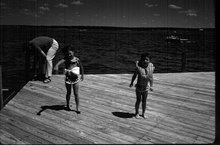
The wish to capture evanescent reflections is not only impossible…but the mere desire alone, the will to do so, is blasphemy. God created man in His Own image, and no man-made machine may fix the image of God.
Leipzig City Advertiser, 1839
Brooklyn, Winter 1987
By mid-fall she was very pregnant. I recall her on a Saturday, wandering the grounds of Pratt Institute, the leaves unimaginably vivid. She was writing a play* and the dialogue wafted in and out of her vision, and she was uncertain about many things, but none more than the future which she held at bay, perpetually, by a firm scrim composed of her own mental chatter.
He was not happy. They had driven up to the Bronx months ago, taken an elevator to a fifty-fourth-floor stuffy high-rise apartment filled with dozens of cats and dogs. It reeked of urine. They adopted two kittens and took them home to the Ft. Green apartment. But he should have known it would not be enough. She wandered in and out of various manifestations of herself. Sometimes she was like a child, petulant and irrational. Sometimes she was even wise, sometimes alluring and provocative. But he never knew who he was coming home to.
Her shoes no longer rang out that clear, arresting sound when she walked along the streets of Brooklyn. The world had settled back into its uninspired state, its cold, grey facades and sounds of traffic and barking dogs. What had happened?
*This was The Bishop of Brooklyn: A Tale of Breaking, Entering, and Cable Television
the forgetting of being -- 12 march 2007
“And today?” writes Heidegger in Quest for Being, “The age of phenomenological philosophy seems to be over. It is already taken as something past which is recorded historically along with other schools of philosophy. But in what is most its own phenomenology is not a school. It is the possibility of thinking, at times changing and only thus persisting, of corresponding to the claim of what is thought.”
“The rise of the sciences propelled man into the tunnels of specialized disciplines. The more he advanced in knowledge, the less clearly he could see either the world as a whole or his own self, and he plunged further into what Husserl’s pupil Heidegger called, in a beautiful almost magical phrase, ‘the forgetting of being.’
--Milan Kundera, The Art of the Novel
Lens
Theme: redemption
I can’t remember now why we had gone down there--some art project or other, and we needed miscellaneous junk. I had been there many years before, and was surprised to find that it was still in business across from the railroad tracks in the someday bustling metropolis of Buda, Texas. It had not changed. It had the feel of snooping around in your grandparents’ attic--accumulations of deeds and records and intimate family letters and photos, all strewn about in piles. I found it hard to balance the tension between the intimacy and the anonymity, as if you were being given the opportunity to look deeply into someone’s soul, and the only price of admission was a dime, a quarter, maybe a dollar if the woman with the bleached hair and bejeweled pince nez thought you were overly interested in your finds--but you had only to express the inconsequence of it, threaten to put it back, to drive the price back down.



